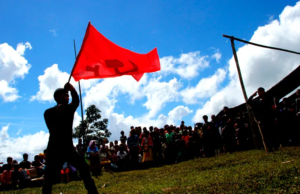In Kazakhstan, Chile at India: Clamor for nationalization of industries resonates

A wave of massive protests erupted in three countries during the past few weeks to demand the nationalization of key industries and oppose the policy of privatization. The largest of these was the uprising of people in Kazakhstan to oppose oil price increases and demand the government to nationalize foreign oil companies. The protests in Chile and India were directed against the privatization of mining and banks.
Natural gas, oil in Kazakhstan
The continuing protests of tens of thousands of people in Kazakhstan erupted on January 2 to oppose oil price hikes after Pres. Kassym-Jomart Tokayev lifted price controls on liquefied petroleum gas. Rallyists demanded the nationalization of all oil and natural gas mining companies which are currently dominated by multinational companies, primarily those of the US.
The protests were initiated by oilfield workers which subsequently spread across all city and town centers in the country. On top of demanding lower prices of natural gas, they also called on government officials to resign. They also demanded the stripping of political power of former dictator Nursultan Nursultan Nazarbayev who they said continue to dominate the country despite leaving his office in 2019 after three decades of dictatorship. Nazarbayev is responsible for privatizing the oil companies of the country in the 1990s.
Globally, Kazakhstan has the 12th biggest oil reserves (30 billion barrels), and 15th biggest natural gas reserves (85 trillion cubic feet). It is capable of producing 1.8 million barrels of oil daily and 1.5 million cubic feet of natural gas annually. The country’s economy is dependent on oil and natural gas extraction, but people do not fully benefit from these resources. The state-owned company KazMunaiGas currently only has minimal shares in major companies which extract the said resources in the country. The biggest of these is the Tengizchevroil which is 70% owned by US multinational companies Chevron (50%) and ExxonMobil (25%), while Kazakhstan only has a 10% share. Similarly, the country only has a 10% share in the Karachaganak Petroleum Operating.
Mining in Chile
People marched across the streets of Santiago, capital of Chile, on January 7 to oppose Pres. Sebastián Piñera’s scheme to railroad contracts for the all-out privatization of lithium mining in the country, two months before leaving office. They opposed Piñera for awarding 20-year contracts to two private Chinese and Chilean companies to extract 160,000 tons of lithium. Lithium, one of the primary mineral resources of the country, is used for the production of batteries, including those of electric vehicles and gadgets.
The Chileans demand the nationalization of lithium mining. They asserted that this should be developed to serve national industrialization instead of being exported in its raw form. Across the globe, Chile has the biggest reserve of lithium which is equivalent to 51% (9.2 million metric tons) of global reserves. Chile has formerly nationalized the mining industry, but this policy was reversed by the late dictator Augusto Pinochet who pushed for the privatization of the industry in the 1980s.
Among those who support the call for nationalization is president-elect Gabriel Boric, who recently won in the national elections and is set to assume office in March. He plans to nationalize lithium mining and establish a national company which will administer the industry.
Public sector banks in India
Around 900,000 employees of public sector banks in India mounted a strike on December 16 and 17, 2021 to oppose the Banking Laws (Amendment) Bill 2021 of Prime Minister Narendra Modi. The employees protested outside the branches of the affected banks in Mumbai, to oppose the impending privatization of public sector banks. The Modi regime intends to privatize five out of 12 public sector banks in the country.
Historically, India implemented the nationalization of banks from 1969 to 1980 as a way to develop the local economy. These banks primarily cater to people in the countryside. The focus of these banks include agriculture, and small industries and businesses. Their programs include cheap credit.





